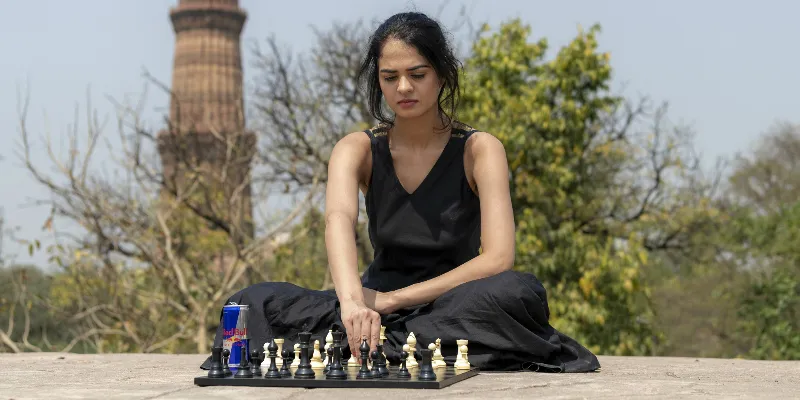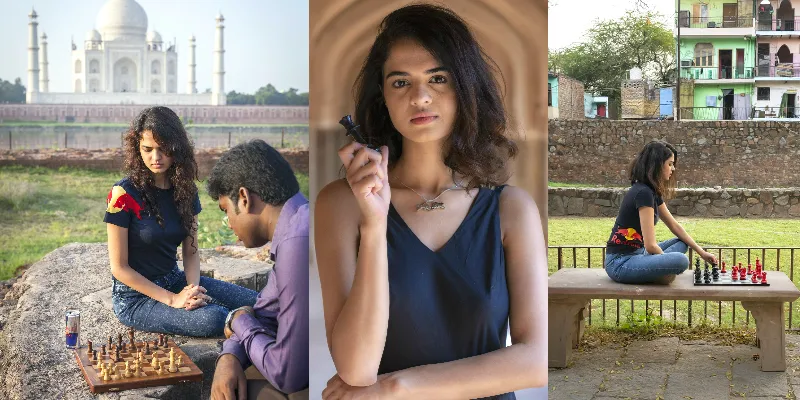Meet Tania Sachdev, India’s 8th woman grandmaster, who won an international title at age 8
The Grandmaster and Arjuna awardee on outwitting opponents on the board and sexists off it; shenanigans with Redbull and the dream of seeing India host a chess league.
"That was such a ‘girl move’ to have made,” scoff the mansplaining onlookers at Tania Sachdev, when the eighth woman grandmaster of Indian Chess is doing what she does best. While her contemporaries often direct this casual sexism towards her with condescension, she, on the other hand, is busy reclaiming the phrase “girl move.”
“Girl moves” are what win international Chess championships before most others are old enough to even spell the word. “Girl moves” are mother-daughter duos who travel across the country to train with the best and get their rightful due. “Girl moves” are placing all of one’s faith in a game that is yet to hit the mainstream in a phallus and cricket-worshipping nation, and then watching all satisfied when that gamble pays off.
If anything, “girl moves” is a compliment, and Tania Sachdev, the grandmaster, tells us all about the journey that made them so.

Making the right moves, at the right time
Born and raised in Delhi, Tania Sachdev did her schooling from Modern School in Vasant Vihar, and studied English Literature, Political Science and Psychology from the Delhi University. Fun fact – Tania’s father learnt the game alongside his little grandmaster, even as the latter checkmated him less than a week into playing together.
The duo stumbled upon the great game when the family of athletes – a father who played football in college, and a mother who played state-level badminton - received one of those elementary, light-weight chess sets as a gift. Tania’s father taught himself the game from the instruction booklet.
Strangely but surely, her father first tried to pique her older brother’s interest in chess, for he didn’t think it would be a five-year-old’s cup of tea. But Tania sat there gaping at that mysterious set nonetheless.
“I picked up the rules, and two or three days later, I asked my dad for a game and beat him. Since then, my parents have always been supportive, and they made me take up professional training,” she recounts.
Ever since that day, Tania started getting more and more involved in the game. When her yearning and drive became apparent, and the family saw that she wasn’t “playing” around, they approached chess grandmaster KC Joshi to coach her.
It was challenging to play the game when she was hardly seven, Tania says, as she missed out on a lot of things growing up. But the young genius was destined for greatness, and she caught on early that she was never cut out for normalcy – her first international win and the British Championship in 1994 came when she was all of eight.
Tania had won the under 8, 9 and 10 championships (boys and girls). The competition also made it to the Limca book of records, as it was a British Championship and an Indian girl took home the trophy.
“I had long working hours with my trainer to discuss openings and study games of other grandmasters. When I returned home victorious, everyone was really excited. This really motivated me and made me want more of it. It felt like this is what I wanted more often,” she says.
This grind before the tournaments has only gotten more gruelling, Tania tells us. “We prepare for a week for almost six hours a day,” she reveals. She was the under-12 Indian champion, Asian U14 girls' champion in 2000, and the bronze medallist at the 1998 World U12 Girls Championship.
Eyeing the prize
She dreamed of becoming a World Champion and realised that her training was not adequate. Therefore, in the course of her professional career, she underwent training from IM Vishal Sareen and GM Ubilava, besides KC Joshi.
Another hitch in her dream run was her observation that women never got their rightful due in Chess. “When I started playing, there were no girl players from North India. I had to travel to South with my mom to play and train, which was really tough. Higher funds as an attraction for players and more tournaments are the need of the hour,” she recounts.
The more challenging scenarios for her are when she participates in open tournaments playing men and women. “Often, you’re at the 40th and 50th seat, which means you’re going to end up playing extremely strong grandmasters and players from across the world, but I love challenging myself,” she says.
However, twenty-four years later, it’s safe to say that she made some game-changing moves to get where she is today. A crucial fork in the road that threw her in introspective mode was the Asian Woman Championship in Iran. She was grappling with a dilemma that every athlete is faced with – even more so in India, whether to make calculated strides in Chess like the Knight while pursuing academics more seriously, or march ahead like a Bishop.
“I think, in my heart I already knew that I always wanted to continue playing chess, but it was a very tough tournament and winning this and going to the podium to collect my trophy was just so special. I knew that I wanted to do this more in my life,” she recounts.
She came to be crowned the Under-12 Indian champion, Asian U14 girls' champion in 2000, and was a bronze medallist at the 1998 World U12 Girls Championship. She also won the Asian Junior Girls Championship in Marawila in 2002.
By 2005, Tania’s dream run began. She amassed enough national and international acclaim to have the title of Woman Grandmaster bestowed upon her, becoming the eighth Indian woman to have done so. She won India's National Women's Premier Chess Championship in 2006 and 2007, and the Women's Asian Chess Championship in 2007. In 2009, in a watershed moment, she received the Arjuna Award.
But she often found that all her achievements were lost on her prejudiced peers. “There were times when they said that chess was simply more suited to the ‘male mind,’ and that women had an intrinsic disadvantage. Some said, “I would never have made that move,” and some said, “That was such a girl move to have made.”
“It happens to me continually, and it’s hard not to let it get to you. I believe it’s the centuries of conscious and unconscious bias, combined with a contemporary chess scene that is riddled with sexism. But this only motivates me to become a better, stronger player,” she says.

Charging bull
In 2012, her partnership with Red Bull came about, and that partnership has not only given her the support she needs, but has also done wonders for the game. “We do extremely innovative and one of a kind events in India. For example, we took chess to the Taj Mahal and I played simultaneously with ten players with a clock siren, which was very challenging. We also played Tweet Chess, which was the first-ever Twitter game, where the most tweeted move played against me. There were players from across the world who had participated. These fun things make me feel like I am giving back to the game and getting people involved in it,” she informs us.
She believes India has a lot of talent in Chess, as it is one of the most-played games in the country in terms of numbers. “Having a chess league will really take the game to the next level, especially for the professionals. Leagues make games more attractive, lucrative and popular. Kabaddi is the biggest example. As a professional player, I can't wait for a chess league,” she says.
When she is not busy being a champion, or championing the game, the Bollywood-buff and trained classical dancer swears by Yoga to keep one’s mind and focus razor-sharp. “Yoga and meditation help calm you down, so you can re-adjust and re-focus your mind. Working on and improving one’s breathing is a great way to make sure your brain works well, even in high-pressure moments,” she reveals.
And now, we hold our breath, as she prepares for the Commonwealth Games, followed by the Olympiad. She will also be competing at the Asian Nations Cup in July, followed by training for the October Olympiad. Finally, she hopes to round off the year at the Isle of Man Open in the last week of October.







